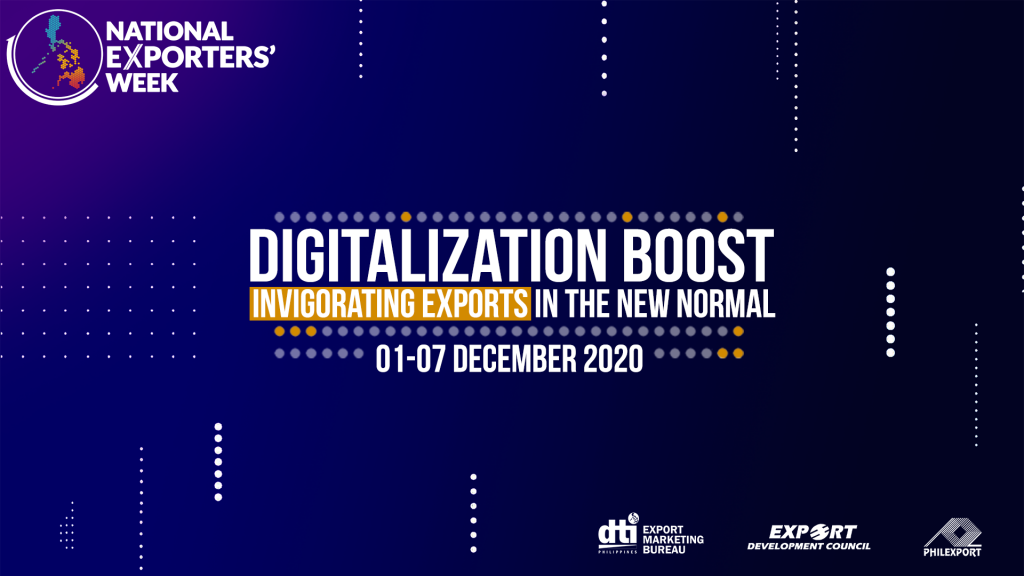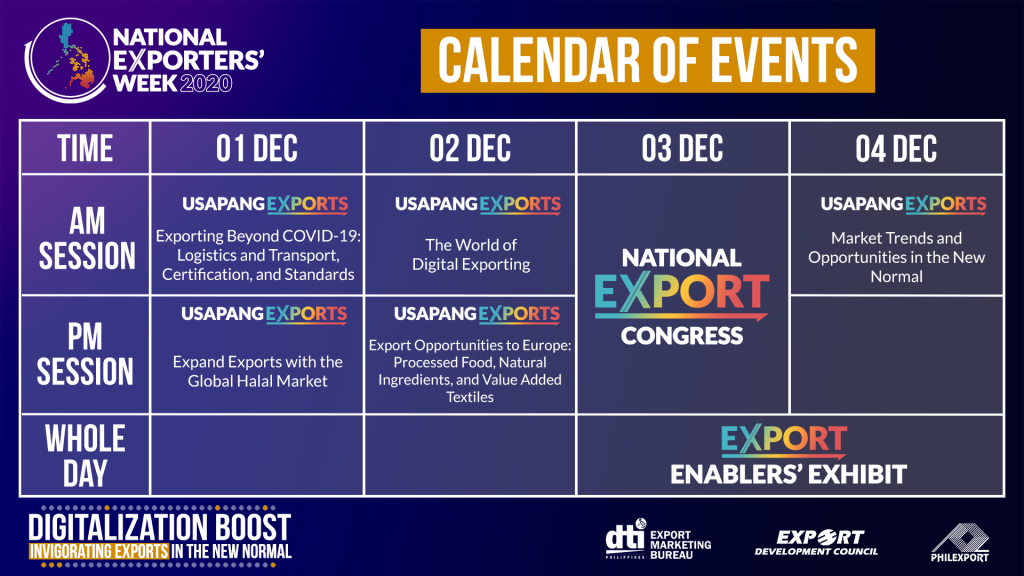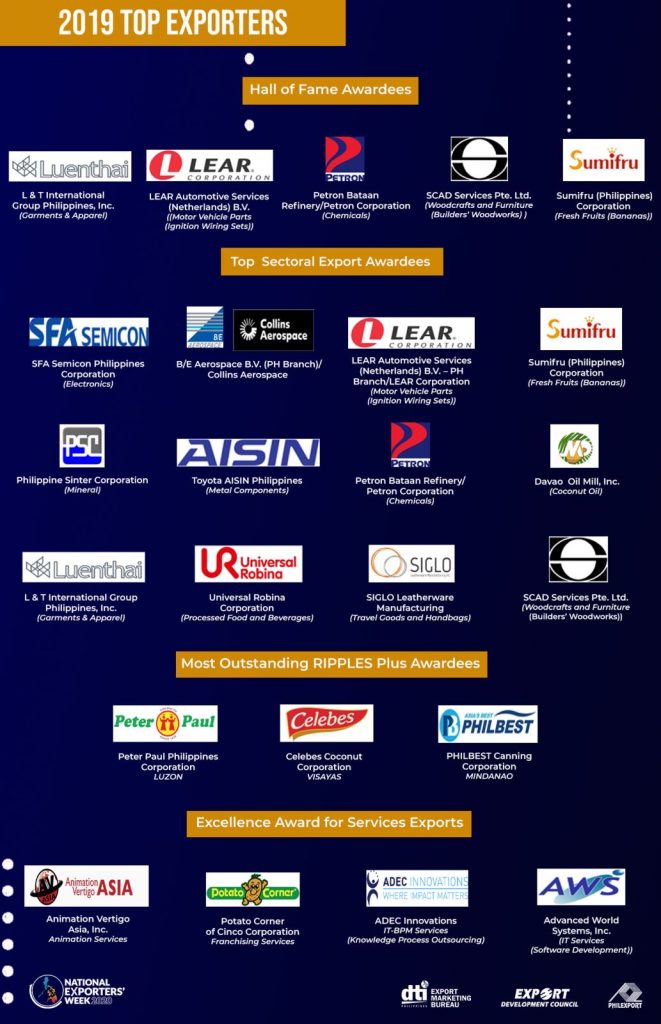by Argie C. Aguja
Also published on: Philippine Star
The sudden outbreak of the COVID-19 pandemic was unprecedented in its global reach and economic, social, and health impacts. It was a shock like no other, involving simultaneous disruptions to both the supply and demand side on the back of subdued private consumption and investment.
As expected, the country’s economic performance contracted, with an Asian Development Bank (ADB) report projecting a 7.3 percent decline before growth returns to 6.5 percent in 2021. Massively suffering are the micro, small, and medium enterprises (MSMEs), including exporters, as global borders were closed consistent with the safety protocols. Nine months after the first lockdown, recovery is however gradually being registered in some sectors, as companies gear up to re-start and increase their business and economic activities.
Through the struggle, government and private sector had been working closely to monitor developments and ensure that the appropriate recovery programs are implemented. From the private sector and true to its mandate, the Philippine Exporters Confederation Inc. (PHILEXPORT) — the umbrella organization of Philippine-based exporters — continued to operate 100% on flexible work arrangements to serve the requirements of over 4,000 members nationwide and the export industry in general. PHILEXPORT works with government in the implementation of this mandate.
On the government’s side, the Department of Trade and Industry (DTI), specifically the Export Marketing Bureau (EMB), continues to oversee the development, promotion, and monitoring of Philippine exports. It provides the exporters the enabling environment to make them globally competitive.
“If the pace of the pre-coronavirus world was already fast, the luxury of time now seems to have disappeared completely. Businesses that once mapped digital strategy in one- to three-year phases have now scaled their initiatives in a matter of days or weeks. Hence, now is the time for bold learning at scale, both for business owners and their employees,” said DTI Secretary Ramon Lopez.
Both are represented at the Export Development Council (EDC), the highest export-policymaking body in the land, where nine agencies are represented at the Cabinet-level to facilitate decision making on export chain issues.

EMERGING FROM THE DISRUPTION
In his recent report during the virtual PHILEXPORT 4th Quarter General Membership Meeting (GMM), PHILEXPORT President Dr. Sergio Ortiz-Luis, Jr. has affirmed the improved export performance in September, growing 2.2 percent to $6.22 billion, from a 12.8 percent annual decline in August. This was mainly driven by the re-opening of China’s economy, which resulted in a 43.3-percent growth in exports to Beijing. Of the top 10 major commodity groups in terms of export value, seven recorded an annual increase. The highest increases were led by cathodes and sections of cathodes, of refined copper at 133.9 percent; other mineral products at 73.3 percent; and metal components at 32.9 percent.
“The Philippine export industry is recovering, resilient and committed towards increasing our competitiveness both for our economy and our buyers,” said Ortiz-Luis Jr. “One silver lining that made this possible is technology that is bridging the physical gap in this pandemic. We see this as an irreversible trend even after this crisis is over.”
In many webinars and programs, the DTI has likewise repeatedly confirmed the need to upgrade in skills and technology to counter the negative impacts of the pandemic and sustain businesses and jobs.
“Now more than ever, exporters need to be equipped with digital tools to help them adapt to a post-pandemic economy. Thus, we have invited experts from different fields to share best practices,” said DTI Undersecretary Abdulgani M. Macatoman of the Trade Promotions Group (TPG).
Meanwhile, PHILEXPORT launched a major initiative called The Road to FIRe or the Fourth Industrial Revolution Project in June, complementing this thrust to facilitate the digitization of MSME operations. The project includes an upgrade of the PHILEXPORT website to a portal, embedding business continuity and digitalization in the system which can serve as a common service facility for its members.
The organization also continues to push for solutions for issues on streamlining and cost of doing business by sharing information on how companies may adopt, adapt, and pivot toward recovery, resilience, and resurgence. To help enterprises re-start, PHILEXPORT also partnered with the SB Corp. to facilitate financing through its COVID-19 Assistance to Restart Enterprises (CARES) program. All these combine to help ensure that members and the export community are prepared for this new normal, Ortiz-Luis added.
NATIONAL EXPORTERS WEEK (NEW) EVENTS

These developments and more will featured in this year’s National Exporters Week (NEW) as part of the collaboration between government and private sector in export promotion and development.
This annual event is mandated by Proclamation 931 Series of 1996 and House Resolution No. 33 which declared every first week of December as the NEW. Led by the DTI-EMB, EDC, and PHILEXPORT, the event features various activities in line with the year’s theme. Highlighting the week-long event is the National Export Congress (NEC) attended by export stakeholders that include MSMEs, government policy makers, business support organizations, and the academe.
Consistent with the protocols, export industry stakeholders will gather virtually on December 3 within this year’s theme, “Digitalization Boost: Invigorating Export in the New Normal.” Undersecretary Macatoman and President Ortiz-Luis Jr. will give their opening statements, while DTI Secretary and EDC chair Ramon M. Lopez serves as a Keynote Speaker. This will be followed by two panel discussions that will tackle digitalization in manufacturing, payments, logistics, and skills upgrading and retooling; and connectivity, e-commerce and education and training.
The panelists include experts and esteemed speakers from both government and private sector, namely, EMS Consulting Group Chairman Perry Ferrer, G-Cash Key Merchants and Acquirers Head Maria Ana Leticia Pascual, Supply Chain Management Association of the Philippines (SCMAP) President-elect Pierre Carlo Curay, Employers’ Confederation of the Philippines (ECOP) Director Antonio Sayo, Department of Information and Communications Technology (DICT) Undersecretary for Special Concerns Emmanuel Rey Caintic, Bangko Sentral ng Pilipinas (BSP) director Melchor Plabasan, DTI e-Commerce Lead Assistant Secretary Jean Pacheco, and Technical Education and Skills Development Authority (TESDA) deputy director Dave Bungallon.
The NEC will also be the venue to launch SheTrades PH Hub, a decentralized platform of the International Trade Centre (ITC) SheTrades initiative implemented and funded by a local host institution, DTI-EMB. SheTrades Hubs contribute to the overall SheTrades goal of connecting three million women to global markets by 2021.
Panelists for the launch include DTI Undersecretary Blesila A. Lantayona, ITC Head of the SheTrades Initiative Vanessa Erogbogbo, USAID Senior Project Management Specialist Liza Bernardo Zurbito, Vesl Co-Founder Maureen Nova Ledesma, Echostore Co-Founder Pacita Juan, and 1Export Co-Founder Melissa Nava.
There will also be a four-day online session taking a closer look at exporting during and after COVID-19. Dubbed as “Usapang Exports,” it will follow the Congress’ digital theme. Session topics will be as follows:
- Exporting Beyond COVID-19: Logistics and Transport, International Certification and Standards for Greater Market Access for Food and Non-Food Exports
- Expand Exports with the Global Halal Market
- The World of Digital Exporting (with Google and Amazon)
- Export Opportunities to Europe: Processed Food, Natural Ingredients, and Value-Added Textiles
- Market Trends and Opportunities in the New Normal
Another milestone will be the first-ever virtual Export Enablers’ Exhibit (3Es), formerly known as Commodity Agencies Exhibit. The exhibit aims to showcase export-related services of national government agencies, financing institutions, startups, and other export trade-related organizations.
In keeping with the NEW’s theme, the exhibit will have a virtual experience which will be completely accessible using the web. The virtual booths will provide a venue where exporters can consult exhibitors to obtain requisite export knowledge and professional guidance necessary in their export business. Serving as an interactive online helpdesk, the virtual exhibit will also offer an opportunity for visitors to chat or call the exhibitors in real-time, leave a message, or initiate an email inquiry
Capping the Congress is the awarding of Top Exporter Awards to deserving and top export performers based on a one-year stellar track record of export performance and who have exhibited excellence and innovation in the delivery of services. The awards aim to recognize exporters who have remained competitive and continue to contribute to the country’s export revenue.

This year, the awards will be presented via Zoom, under the following categories: Top Exporter Award (12 companies), Most Outstanding RIPPLES Plus Award for Luzon/Visayas/ Mindanao (three companies), Excellence Award for Services Exports (four companies), and the Hall of Fame Award (five companies). ♦
Date of release: 02 December 2020


